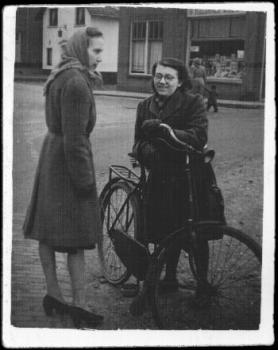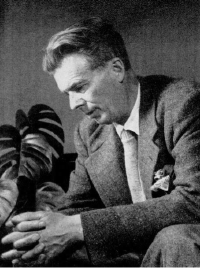Aldous Huxley (1894-1963)
Jeremey Pordage has just arrived in Los Angeles airport. He’s been hired by a local millionaire, Mr. Stoyte, to catalog his recently acquired journals of the fifth Earl of Hauberk, a member of the minor nobility of 18th century England. Driving toward Stoyte’s castle in a chauffeured limousine, Pordage sees Consul gas stations, owned by Stoyte, a cafe shaped like a bulldog, a real estate office built to resemble the Sphinx, and the Beverly Pantheon, a cemetery with statues, fountains, a perpetual Wurlitzer organ, and a wedding chapel. En route they pass Stoyte’s Hospital for Sick Children. the chauffeur stops momentarily to pick up Mr. Propter, the manager of Stoyte’s extensive farming interests. Approaching Stoyte’s castle, the auto passes over a moat, through several gates and into a sort of keep before parking. Mr. Propter proffers a few bits of advice re Stoyte: he’s manic, has had a stroke, has a very short fuse, and worries a lot. Soon, Jeremey meets the tubby, fidgety owner who takes him on an orientation tour. The building is constructed on top of a hill, with a swimming pool on the top floor. Descending on one of the elevators, they visit the library, lushly decorated with famous paintings and woodwork by Grinling Gibbons, but with no books. The lower levels contain a laboratory, where Dr. Obispo conducts his researches, and the collections facility, where Jeremey is to work. Later, Peter Boone, lab assistant to Dr. Obispo, and Virginia, Stoyte’s girlfriend, appear.
After several days, Jeremy and Peter, a personable sort, meet mister Propter in order to investigate some of Stoyte’s agricultural interests. They have a nice visit under some eucalyptus trees and talk about the dire plight of the migrant workers suffering on Stoyte’s farms. They poor souls live in vermin infested conditions and are paid pennies a day. Propter does his best to improve their lives, but his boss hates the poor because he was once like them; also they make him feel guilty, for which he actively tries to make their existence more miserable. Propter is a wise and learned soul, who over a good quarter of the book decants his philosophical views about life and reality into the willing ears of his companions. Basically, life on earth is divided into three levels: animal, human, and spiritual. Humans are trapped by time and craving, which they must overcome in order to enter the upper level, a kind of enlightenment in tune with the universe and true reality. People are basically trapped into the middle level, ignorant and misled about almost everything. Attempts to do good are usually foiled and evil almost always results.
Later, Stoyte becomes jealous of Peter, who he thinks is making love to Virginia. Actually Dr. Obispo is the guilty party. Dashing about with his revolver, Stoyte shoots Peter to the amusement of Obispo, who is an amoral villain with a sadistic sense of humor. Obispo’s researches have been directed into the search for immortality at the behest of Stoyte, and, discovering clues in the pages of the journals being examined by Jeremey, he induces Stoyte to undertake a trip to England to investigate the mysterious catacombs underlying Hauberk’s ancient castle in the hopes of uncovering the truth behind the subtle hints revealed in the journals.
The ending of the book is pretty grim. In fact, i wish i’d never read it, in spite of the fairly interesting ideas of Mr. Propter. I think Huxley must have been influenced by the terrible effects of the first World War and thrown into an emotional abyss by the Spanish Civil War, which some of his friends participated in, as well as experiencing a lot of depression over the immediate future, which he must have known was going to develop into another global holocaust. The book was published in 1939.
Insofar as the actual writing was concerned, Huxley was a master craftsman; the details in the book highlight to an almost egregious degree the irony and sarcasm inherent in the indiscriminate flourishing of money. Although Propter (propter hoc is abbreviated Latin for a basic logical fallacy) had interesting ideas, they were pretty one-sided and nebulous, i thought, and i couldn’t help but feel that they were due to H’s depression and anxiety over what he saw lurking in the future. I wouldn’t recommend this book to anyone unless they had a imperative need to probe the depths of Huxley’s thought. His other works are much better, i think; I’d start with Chrome Yellow, a very funny parody on the activities of the British upper classes.



When I think of Huxley, Mudpuddle, I always think of Brave New World. And now I think about it, that one’s got some wit, too.
LikeLike
it’s been a long time since i read that, Margot… but i did read Chrome Yellow not too long ago and i thought it was riotous! tx for the comment; hope things are going well for you…
LikeLiked by 1 person
I have been meaning to read Brave New World for awhile. I have heard that it was well worth doing so. You have made me curious about the ending. With that, I have become squeamish about disturbing books so maybe I would be better off not reading this one.
LikeLike
if you do decide to tackle it, Brian, do it outside in plenty of sunshine… i researched him a bit and found out he was almost blind for most of his adult life, which might or might not account in some respect for his somewhat insular pov… i really ought to find out more about the authors i post about… but then i wouldn’t have time to write the posts, haha… i wasn’t negative about violence or horror until i passed sixty, then it sort of crept up on me: probably some sort of subconscious reaction to the approaching final curtain…
LikeLike
Like Brian, I have had Brave New World on my bookshelf. As I read your review I thought that this book is exactly up my alley, until you said the ending is grim and that you wish you hadn’t read it. Now I’m torn. I think I’ll look it up anyway and try to decide.
LikeLike
i hope you don’t, Sharon… it’s not something you want to carry around in your memory… but i shouldn’t tell you what to do; you know yourself best… or you could just quit reading at the last chapter; the text before that is interesting if somewhat off the wall…
LikeLike
I think most people must be forgiven for bleak, cynical outlooks in Huxley’s world …. for many their times were nightmare years of disappointment and weariness … I guess I’m in a tolerant mood today … Huxley for me is a lens through which I can understand others …. que sera sera ….
LikeLike
you’ve got a point there, RT… i should back off in my recommendations, i suppose…
LikeLike
Nay … never back off … I enjoy your musings ….
LikeLiked by 1 person
I find Huxley a little bit alarming. I do get the impression from his books that life was a little too much for him at times. Oh no, wait, that was H.G. Wells …. I tend to get the two mixed up but they both seemed to have had a similar outlook on life in that aspect. I think authors like this are valuable reads but only if you read their books once in awhile. A steady diet of this stuff would probably make one sick.
LikeLike
hahaha, i laughed! maybe that’s why i… never mind… i haven’t read a lot of either, although i think i prefer HG to AH… as i mentioned above i really liked chrome yellow, though… i know HG got really depressed toward the end of his life about the future humans were building for themselves… poor guy; i’ve thought that he hadn’t researched human history too well, to think that things were going to be different just because of a bit of technological invention…
LikeLiked by 1 person